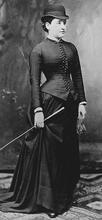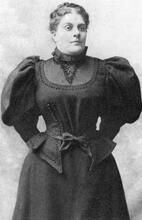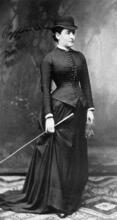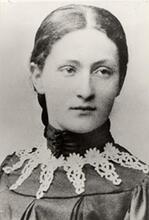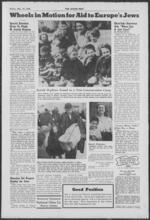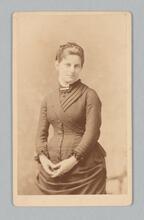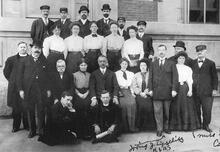Rose Gruening
Rose Gruening created a number of social assistance organizations to aid immigrant families, offering childcare, funding for college educations, and even a summer camp. After Gruening graduated from Vassar in 1895, she began volunteering at the Madison House and in 1907 convinced the House trustees to establish a summer camp for underprivileged children in Mountainville, NY. Gruening was creative in finding ways to stretch the funds for Camp Moodna, buying up twenty retired horse cars from a trolley company to use as the first cabins. Later, Gruening helped found an offshoot house in an underserved neighborhood, the Arnold Toynbee House, in 1916. Throughout the 1920s and 1930s, the Grand Street Settlement offered children’s social clubs, childcare, and even showers. By Gruening’s death, Grand Street was serving 1,600 children and 200 mothers weekly.
Known during her lifetime as the “Angel of Grand Street,” Rose Gruening was head worker and founder of the Grand Street Settlement in New York City. Although Gruening never liked this title, it attests to her significance in the eyes of many people. Like Jane Addams, Lillian Wald, and other women settlement workers of the early twentieth century, Gruening helped to create a social “safety net” through voluntary civic activism, before the concept of public responsibility for poor and disadvantaged Americans was enacted by the U.S. Government. Once the Depression and the New Deal transformed the workings of social welfare in the United States, the social service concept as practiced by Gruening and her contemporaries changed dramatically. Before it did so, however, thousands of immigrant families from the Lower East Side of New York experienced Gruening’s settlement house activism in personal and profound ways.
Early Life and Family
By the time Gruening established the Grand Street Settlement in 1916, she was intimately familiar with both the urban environment of New York and social service work. Rose Gruening was born in New York City in 1876 to Rose (Fridenberg) and Emil Gruening, a well-known eye and ear specialist. The elder Rose Gruening died of typhoid fever when giving birth to her daughter. Four years later, young Rose’s father married his late wife’s sister Phebe and with her raised four more children: Clara, Marie, Martha, and Ernest. Both Clara and Martha became writers, and their brother became a well-known journalist and editor for such newspapers as the New York Evening Post and the New York Tribune. Growing up in New York City near Gramercy Park, Rose Gruening attended the Ethical Culture School and later graduated from Vassar College. While the Gruenings subsequently moved their family home uptown to 57th Street, Rose Gruening began to focus her professional interests even farther downtown, on Manhattan’s Lower East Side.
Philanthropic and Social Work
Gruening began her philanthropic career as a volunteer social worker in Madison House, the Ethical Culture Society’s settlement on the Lower East Side. Accounts of Gruening’s early career suggest that she first became interested in social work after college, when she visited an Ethical Culture School summer camp for poor children. In 1907, after having joined the staff of Madison House, Gruening persuaded its trustees to establish a summer recreation spot in Mountainville, New York, for the settlement’s urban dwellers. She called it Camp Moodna. Housing at Camp Moodna originally consisted of twenty converted horse cars, which Gruening obtained inexpensively from a transit company that was about to replace its older, horsedrawn cars with trolley and cable cars.
Over the next few decades, Camp Moodna changed hands as Gruening expanded her settlement house work. By 1916, Madison House was serving more people on the Lower East Side than it could easily accommodate. Rather than build an even larger Madison House, though, Gruening and some of her colleagues wanted to establish a smaller settlement in an underserved neighborhood. Gruening founded the new settlement on Division Street and named it the Arnold Toynbee House after the famous British social reformer. After three years, the settlement moved to larger quarters on the corner of Grand Street and East Broadway, aiming to improve the living and working conditions of people in the community by addressing the underlying causes of their poverty. During the 1920s and 1930s, the settlement organized children’s social clubs, offered child care for working parents, and provided showers for community residents whose homes had no running water. In 1925, its name was changed to the Grand Street Settlement, and during the Depression years, Camp Moodna was donated to the Grand Street Settlement in honor of Gruening.
Rose Gruening died at Camp Moodna on July 31, 1934, but the legacy of the “Angel of Grand Street” continues at the Grand Street Settlement even today.
AJYB 37:257.
EJ; Gruening, Ernest. Many Battles: The Autobiography of Ernest Gruening (1973).
Obituary. NYTimes, August 1, 1934, 17:4.


